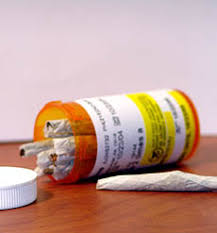
A recession can do funny things to people. It can make some staunch red states rethink their stance on marijuana.
Okay, let me preface this with a disclaimer: I am not a pothead. I'm not a liberal, raving "right to get high" activist. I'm a pragmatist.
And so, apparently, are Tennessee, Alabama and Texas, among other states. They're looking at the looming catastrophes that are their budget deficits, comparing those with what they HAVE to spend by state and federal mandate, and looking for places to cut. And that's where marijuana comes in.
Law enforcement across the nation spends up to seven billion dollars a year enforcing laws against marijuana, according to a study done by Doctor John Getman.
And states are now considering whether they can afford to keep enforcing that prohibition, according to NORML, the marijuana law reform lobbying group. They're getting phone calls from states they never expected to hear from, legislators looking for the hard facts about marijuana, medical marijuana, scientific data...information they are using as they decide whether it's time to decriminalize marijuana.
There's a precedent for this. FDR partially repealed prohibition during the Great Depression. It made sense. It was an industry that was in demand, it was an industry that could be taxed. And regulating that industry eliminated the criminal distribution of booze.
This seems to make sense with marijuana, too. Studies don't agree on the "gateway drug" argument - in fact, the biggest study on the topic concluded there was absolutely no evidence that marijuana use led to harder drug use. There is apparently no evidence that anything in the chemical makeup of marijuana leads to cocaine, crack, heroin, meth or any of the other drug scourges of our time. The actual gateway drugs were cigarettes and alcohol.
And there is a great deal of evidence that medical marijuana is a gift for cancer patients. It relieves nausea, restores appetite and does it instantly, with no need for a queasy patient to swallow anything. And it's far cheaper than a legal marijuana alternative pill that often isn't covered by insurance.
Millions of people use pot. Millions of them. Nobody's monitoring it except the police. Tons of illegal marijuana is brought into this country from elsewhere, and there is no quality control.
There is money to be made. Think of the money if pot was taxed at the same exorbitant rate as cigarettes. California has medical marijuana and though it accepts tax payments from those clinics, it doesn't officially tax it. And safety standards, legal regulations could be put in place.
Want to do some investigating? Here are two studies:
Http://prohibitioncosts.org http://drugscience.org
And here are the facts presented with no bias for either side.
http://procon.org

No comments:
Post a Comment